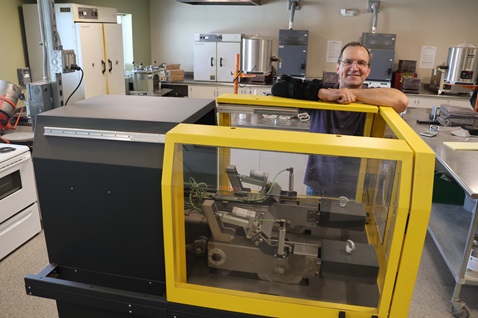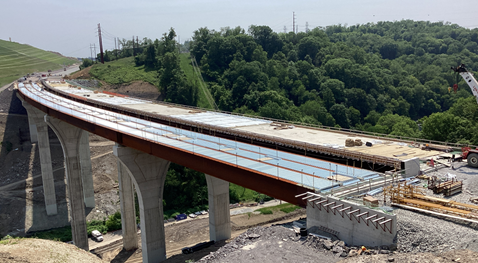
August 2025
PA Turnpike Materials Lab makes discovery to prolong asphalt life, save millions of dollars
A little dab will do you.
When Brian Paroda and his team discovered that about 70% of the asphalt samples they tested were deteriorating faster than expected, they put a new hypothesis to the test -- a little bit of a new chemical compound may help the roadway last longer.
And that little bit of Silane may save a lot of money in the process, too.
“If we can remedy some of these inherent issues that come with asphalt, then perhaps we can assist with providing at least one extra year of durability,” Paroda said. “If we can do that, we’re looking at hundreds of millions of dollars in savings.”
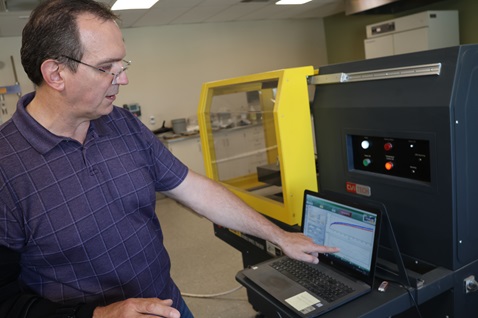
Brian Paroda operates a Double Wheel Track, which applies cyclic hydraulic pressure to asphalt samples to determine how long it will last on the road before developing ruts. It's one of many pieces of gear at the Materials Lab.
Paroda is the Supervisor of the PA Turnpike’s Materials Laboratory near the Somerset Maintenance Facility, where he and his team of lab technicians take on a wide variety of jobs from testing roadway samples to experimenting with new asphalt mixes. They are digging down into the basic chemical makeup of the Turnpike’s asphalt to ensure the recipe of the materials coming in from contractors matches the Turnpike’s specifications.
They use equipment that mimics wear and tear, pressure, roadway rutting, heat, and more, all to recreate extreme conditions to test how that asphalt will fare over time.
Beyond testing samples of new asphalt, they’re also taking cores from the roadway to see how the asphalt is holding up, and it was in this process the team discovered moisture damage had stripped away much of the liquid binder that holds the components of the asphalt together, causing it to break down years ahead of its time.
While they investigated what could have caused this stripping -- alkaline in the water, sodium-calcium brine sodium used in treating the highway, or some unknown factor – they found a solution that may prevent this in the first place.
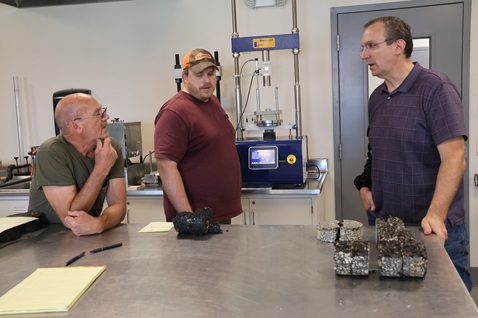
Materials Lab Supervisor Brian Paroda (right) discusses the results of tests on several recent roadway samples with his team, who include Brian Wilt (left) and Brian Miller.
The lab is now testing a Silane-based anti-strip additive, which requires just a small amount added to the mix, causing a chemical bond that makes the asphalt more water repellent, keeping out the moisture that was breaking down the asphalt binding agents.
Paroda noted anti-strips made from animal fats had been used for more than a decade but were not working as advertised, but the lab’s research shows the new product will perform better in the same scenarios.
He penned an article for the Bitume Quebec publication on his findings, which are now being put to the test on the Turnpike.
Brian Miller works in the lab with Paroda, handling a range of tasks from running the ovens to checking asphalt content. He’s excited about the new findings.
“It’s great to be a part of it,” he said. “We’re doing the work and research and finding the available options. It’s a great experience.”

Brian Miller of the Somerset Materials Laboratory runs a roadway sample through a press, which applies pressure to a specimen to determine its crack resistance, strength, and plasticity.
All specs for new asphalt materials now incorporate Silane-based anti-strip, and that’s a big win if it gets a few extra years out of the Turnpike’s asphalt.
Testing will continue over the next few years to assess how well their product works in extending the life of the roadway.
“I’m proud of the work our team has done at the lab,” Paroda said.
Next phase of PA Turnpike expressway making connections in Pittsburgh area coming soon
A boon to mobility and economic development in the Pittsburgh region is coming soon with the construction of a new stretch of a PA Turnpike extension.
Pennsylvania Turnpike Commissioners last month gave the go ahead to advertise for the construction of the next three miles of the multi-stage Mon/Fayette Expressway project.
"It’s exciting,” said Senior Engineer Project Manager John Dzurko, who is overseeing the project. “One of the things I like best about my job is when you’re starting out, you’re looking at fields and wooded areas, and then as the project progresses and you see where the highway alignment goes and ultimately you get to see a finished product and there’s something there that wasn’t there before, it’s definitely fulfilling."
When complete, the Mon/Fayette Expressway, otherwise known as PA Turnpike 43, will connect Interstate 68 near Morgantown, West Virginia, to Interstate 376 in Monroeville. But such a large project will take time and has been broken down into multiple segments.
Mon/Fayette Expressway Sections 53A1 and 53A2 are under construction now, and construction on 53B1A is expected to start in the spring. When the entire Southern Section is complete, the Northern Section (not shown) is next, connecting the expressway to I-376 (click photo to englarge).
The current highway was completed in 2012 and runs from Morgantown to PA Route 51 in Jefferson Hills, Allegheny County, and construction picked up again with in 2023 with the next stretch extending to a forthcoming, new interchange at Camp Hollow Road in West Mifflin.
The newly approved section, called 53B1A, is in the final design stage now and should go out to bid in December with construction starting as early as spring. It will pick up where the previous section left off and run to a new interchange at Pittsburgh McKeesport Boulevard in Dravosburg.
"It will definitely improve mobility in the Mon Valley area," Dzurko said.
Much of Pittsburgh was built around rivers and hills, so a brand-new, four-lane highway traversing it all in the heart of the city’s steel industry is expected to attract residential and industrial development and help commuters get around the region, he added.
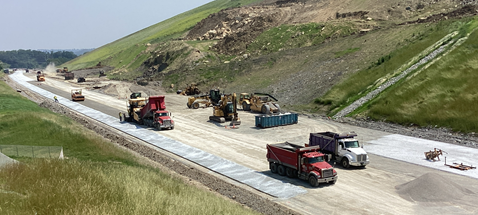
Construction is underway for the bridges over Coal Valley Road, which are part of the Mon/Fayette Expressway.
But constructing a new highway and three bridges through this rugged terrain of valleys and ridges is no easy task and will require a mass excavation, bringing in 100-ton trucks to move more than 1.5 million cubic yards of earth and laying tens of thousands of feet worth of pipe for stormwater drainage before crews can start placing the actual roadway itself.
The estimated cost of the new section of the Mon/Fayette Expressway is about $177.5 million and should be completed in 2029.
"Just the magnitude of it all and the miles after miles of construction is really something to see,” Dzurko said. “Projects of this size just don’t happen every day. I’m just lucky to be a part of it."
Award-winning speed-safety-camera program helps make work zones safer
A program that has played a significant role in reducing speeding and crashes in the Pennsylvania Turnpike’s work zones brought home an international award last week.
The Pennsylvania Statewide Work Zone Speed Safety Camera Program is the winner of the 2025 Institute of Transportation Engineers (ITE) Transportation Award in the Safety category. This is the second major prize recognizing the program that deters speeders by posting cameras in work zones and sending citations to violators.
“It’s continued validation that this program is making a difference,” said PA Turnpike Director of Traffic Engineering and Operations Tom Macchione. “And it continues to make a difference in saving lives by reducing speeding and work zone crashes.”
It doesn’t stop with the pair of awards. In next year’s construction season, the PA Turnpike will receive five new Work Zone Speed Camera enforcement units, bringing the total number to 12 for PennDOT roads and 12 for the PA Turnpike.
The Work Zone Speed Safety Camera Program is a collaborative effort between the PA Turnpike, PennDOT, and the Pennsylvania State Police, all of whom took home the most recent award from the ITE International Annual Meeting and Exhibition in Orlando, Florida, in August. This was preceded by the American Council of Engineering Companies of Pennsylvania (ACEC/PA) Grand Conceptor Award in January.
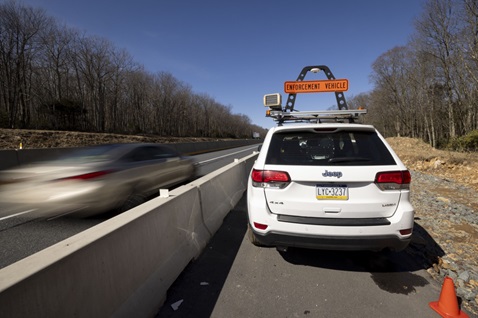
The above picture is an example of a speed-safety-camera setup, typically positioned along shoulders in work zones.
The program works like this: Cameras on SUVs are deployed in work zones to deter excessive speeding, sending vehicle owners a warning at first, followed by violation notices with fines for subsequent offenses. It started as a five-year pilot project, and Gov. Josh Shapiro signed legislation in December 2023 to make the program permanent.
During the 2024 construction season, speeding in work zones with speed cameras present was reduced by 17% while excessive speeding (11 mph or more over the posted speed limit) dropped by 2.9%. The cameras not only reduced speeding but reduced work zone crashes, too, by up to 50% when enforcement units are present.
That’s pretty significant, Macchione said, when nationally, work zone crashes are on the rise.
“What’s great about this program is it improves driver behavior,” Macchione said. “What we’re seeing here is measured, sustained speed reduction.”
Drivers are slowing down, and they’re getting the message, too. Perhaps the most impressive stat is that 94.8% of violators only receive one notice, adjusting their behavior before receiving a second citation.
For more information about the Work Zone Speed Safety Cameras, check out this roundtable discussion about the difference the cameras are making in work zones:
PA Turnpike lends green thumb to Giving Garden
As the warm summer months are in full swing, so is the PA Turnpike’s community Giving Garden, where neatly organized rows of produce burst to life with color.
Transportation Planning Specialist Pam Hess, who leads the volunteer-run Giving Garden at the PA Turnpike’s Central Administration Building near Middletown, is passionate about not only growing food for others but also focusing on growing a community that finds time together outside of the office.
The Giving Garden was first conceptualized in 2016, and it blossomed into a community space in 2018, thanks to the Women’s Network at the PA Turnpike and its team of green-thumbed volunteers.
Hess said last year, the PA Turnpike was able to donate about 1,300 pounds of produce to area food pantries, and her goal is to hit 1,500 pounds this year.


